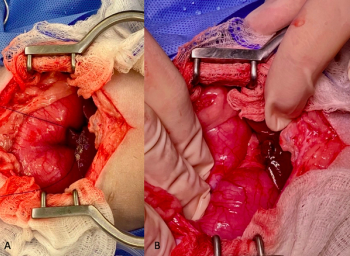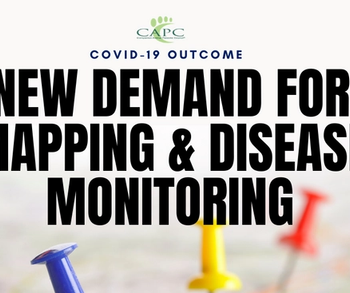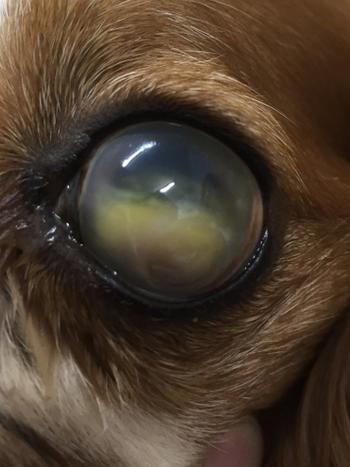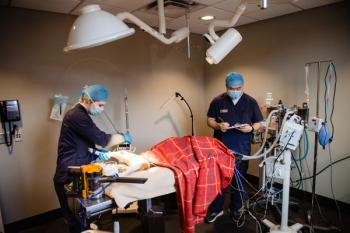
This succinct review of equine internal parasite control measures reflects modern strategies now in place to reduce development of resistance.

This succinct review of equine internal parasite control measures reflects modern strategies now in place to reduce development of resistance.

If immune-mediated hemolytic anemia makes you crazy, you are not alone. Here’s the lowdown on diagnosing this confounding disease.

Check out this week's top veterinary headlines.

Identifying IBD is often a challenge, but the recent discovery of serum-based markers for canine IBD may make diagnosing this disease in dogs quicker, cheaper and less invasive.

Dogs have long been known for their superior ability to detect scents. A new study shows that those snouts may be able to detect heat as well.

Following its worldwide survey of mental health and wellbeing in the veterinary profession, WSAVA vows to take steps to advance the health and welfare of veterinary teams around the world.

Causes of feline diarrhea range from simple infection to cancer. By characterizing the diarrhea and running simple tests, the practitioner can identify the pathology and stop the mess.

As shelter-in-place restrictions are lifted throughout the country, the full impact of the pandemic shutdown will come into clearer focus. Here are four major challenges veterinary practices can expect—and how to handle them.

Summer is just about here, and so are the mosquitoes. Here’s why—and how—to talk to your clients about heartworm disease prevention in cats.

How to turn the threat of online pharmacies into opportunities for your practice.

Veterinary ophthalmologist Dr. Ron Ofri shares a few tips to help in diagnosing blindness in your veterinary patients.

Check out this week's top veterinary headlines.

Euthanasia should be a gentle death, but when it’s not—for whatever reason—it is incumbent on veterinary teams to address the situation with their clients and themselves.

Your clients might question the need for annual heartworm testing if their dog has been on a preventive throughout the year. Now you can give them the answers easily.

Give your clients the facts about the damage heartworm disease can do not only to their pet’s health but also to their pocketbook.

Heartworm disease prevention and annual testing are a must for dogs and cats across the United States, says Dr. Stephen Jones. Here’s why.

Answers from experts to the COVID-19 questions on every veterinary professional’s mind.

Nutritional information is a key part of a veterinary patient’s history and crucial to good medical case management, yet this information can be elusive. According to the results of a new study, how you phrase your question can make all the difference between an ample answer and a lean response.

A guide for general practitioners in performing hepatic guillotine and punch biopsy techniques.

VetMedAcademy and Merck Veterinary Manual are co-sponsoring a contest to celebrate faculty creativity during the COVID-19 pandemic.

With so many practices turning to telemedicine during the COVID-19 pandemic, experts share what it really means—and some key benefits of incorporating telehealth into veterinary practice.

Join The Bridge Club and CAPC on May 13 for an important conversation about how COVID-19 has shined a spotlight on One Health in an evolving world.

A veterinary dermatologist provides diagnostic insight into the triggers and clinical signs of erythema multiforme, and how best to resolve the condition.

In the spirit of “building a better mousetrap,” researchers have tested a novel measurement protocol—the manubrium heart score—for flagging cardiac disease in dogs.

A veterinary ophthalmologist outlines the classification, diagnosis and treatment of a leading (and painful) cause of blindness in dogs.

The latest edition includes access to a companion website with exclusive COVID-19 protocols to help you manage your team during a pandemic and other emergency situations.

This new resource offers veterinary professionals and students an opportunity to earn RACE-approved CE credit via a series of informative online webinars.

Antibody titers are a tool to assess an individual patient’s immune response to vaccination for some common diseases. As titers grow in popularity, veterinarians must learn when to perform them and how to interpret the results to maintain patient health.

There are a million things to keep track of in this fast-paced position—all while keeping your patients alive and comfortable.

An Australian veterinarian explains how veterinary practices in his country are adjusting their work during the COVID-19 pandemic.